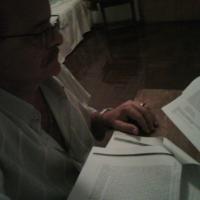Meddelelser: 40
Sprog: English
sproshua (Vise profilen) 25. sep. 2015 19.41.00
jefusan:i see. what you describe as "programmed" i'd be inclined to call "wired". for me, human "programming" is how the world molds each individual. exposure to human culture, entertainment, advertising, propaganda, etc., to me is what programs us, and, imo, is the stronger influence on how we interact with each other.sproshua:I mean that evolution has left us with many instincts that may have been more useful before we had to live together in towns and cities. Protect your immediate family first, tribe second. Outsiders are threats who will steal your resources and your mates, and possibly kill your children. Society and self-awareness have given us the tools to imagine a better way, but way down deep our ur-chimp brains still whisper to us, "Beware of the others. They'd kill you if they had the chance. Stand your ground, or kill them first."jefusan:Humans are programmed to find reasons to hate each other, whether it's nationality, skin color, religion, language, favorite sports team, or which side you butter your toast on.could you elaborate on what you mean by "programmed"?
I also believe that something about higher thought — maybe it's a side effect of language — has made humans overly dependent on labels and boundaries. This is alive, this is not. This is a glass, this is a cup. This is a Greek, this is a Roman. The truth, as far as anything can be called true, is rarely so simple.
Vestitor (Vise profilen) 25. sep. 2015 21.32.41
Tempodivalse:If you back a few posts you'll see I was talking about the use of an IAL for purposes unrelated to wars (civil or otherwise). The use of English is promoted for communication in spheres a lot broader than trying to mediate conflict, Esperanto could just as well fill (part of) that space.Vestitor:Sure, but I think we have to be careful when using that line of argument in favor of an Interlanguage. It's quite vulnerable to counterexamples - think of all the civil wars where both belligerents had a common language.jefusan:But we'll better understand the threat if it's in Esperanto, ĉu ne?
I, for one, think we could all be speaking the same neutral, international language and would still find as many reasons to kill each other as we do now.
I think the Esperantist who actually still considers the language as an IAL (rather than an academic toy) is way past imagining that it will secure world peace.
jefusan (Vise profilen) 28. sep. 2015 14.59.27
sproshua:Fair enough. Maybe wired is a better word, though the metaphor falls apart with brains a bit anyway. The hardware and software are harder to tell apart, and evolution took care of the wiring and the OS.jefusan:i see. what you describe as "programmed" i'd be inclined to call "wired". for me, human "programming" is how the world molds each individual. exposure to human culture, entertainment, advertising, propaganda, etc., to me is what programs us, and, imo, is the stronger influence on how we interact with each other.sproshua:I mean that evolution has left us with many instincts that may have been more useful before we had to live together in towns and cities. Protect your immediate family first, tribe second. Outsiders are threats who will steal your resources and your mates, and possibly kill your children. Society and self-awareness have given us the tools to imagine a better way, but way down deep our ur-chimp brains still whisper to us, "Beware of the others. They'd kill you if they had the chance. Stand your ground, or kill them first."jefusan:Humans are programmed to find reasons to hate each other, whether it's nationality, skin color, religion, language, favorite sports team, or which side you butter your toast on.could you elaborate on what you mean by "programmed"?
bwc1976 (Vise profilen) 18. mar. 2016 12.52.04
ravana:In fact how did you even heard for it ?I first heard of it while looking through my mom's dictionary as a kid, in the front there was various reference information including alphabets of various languages and Esperanto was one of them, and I noticed the funny markings over some of the letters but didn't think about it much after that. Then when I was a teenager, I started watching the TV series Red Dwarf, and everything on the space ship was marked in both English and Esperanto which I thought looked cool, and one of the characters was constantly trying to learn Esperanto.
Again I didn't think about it much after that, but I did have an interest in toying with different languages in general. I took Spanish in high school and college but never really got fluent, also one semester of Japanese which in some ways was actually simpler than Spanish but in other ways much harder and I knew I'd never be able to learn to read kanji unless I moved there and was forced to. After college I studied some German and some Swedish on my own but again came to the conclusion I would never be fluent unless I lived somewhere that I was forced to live and breathe it.
Finally about 5 years ago, a Facebook friend of mine was talking about Esperanto so I decided to have a closer look at it, and I quickly fell in love with how simple and logical and consistent it was, plus the whole community aspect such as la Pasporta Servo, kaj la Kongresoj, and of course lernu.net, and I started learning using lernu.net and phone apps such as Anki and Intense Esperanto. I don't know how many of these places I'll ever actually get to visit in my life, but the whole concept of having a language that I could potentially hang out and talk with people in Brazil or Poland or China that's both easier for them than English, and easier for me than their languages, is pretty dang awesome. I'm still working on getting my listening/talking skills up to anywhere near the level of my reading/writing skills, but it's fun to think about.
bartlett22183 (Vise profilen) 18. mar. 2016 17.55.26
ravana:In fact how did you even heard for it ?In 1961 I was a beginning secondary school student in the central USA. In my region, foreign (non-English) languages almost didn't exist. However, I did enroll in Beginning French, one of the few foreign languages available in my high school.
Our text book, published in England of all places (for an American school), described French pronunciation in the International Phonetic Alphabet, which was completely unknown to us. I went to the public library in this small city and asked a stereotypical little old lady librarian if she knew anything about the IPA. She brought me a book about the "international language" Esperanto. 54+ years ago is how I learned about E-o.
Years later, in 1972, there was an E-o Universala Kongreso in the (US) city in which I was then living. There were some short news pieces on the television news, and a number of books were donated to the local public library and the state university library in the city. I became curious and looked at some of those materials. They were my real introduction to Esperanto. I have never really learned it in the sense of writing it fluently, although I can probably read 85 - 90% of an E-o text without resort to a dictionary, but have never had the opportunity to try to speak it and have heard very little spoken.
As a strong supporter of the international auxiliary language ideal, the two languages which I think have any remote chances of success are Esperanto and Interlingua.
eriksangel15 (Vise profilen) 20. mar. 2016 12.56.18
I took Spanish in high school and college 10-15 years ago, and as I began to study Esperanto via Duolingo and here, I found my knowledge of Spanish was extra helpful.
I also have an interest in learning many languages in order to communicate with people from around the world. My Spanish isn't perfect but I can at least speak with people in Spanish. If I can at least get that far with Esperanto or even become fluent one day, I'd consider that successful.
Alkanadi (Vise profilen) 20. mar. 2016 13.35.38
eriksangel15:My Spanish isn't perfect but I can at least speak with people in Spanish. If I can at least get that far with Esperanto or even become fluent one day, I'd consider that successful.According to the foreign service institute, it takes about 600 hours on average to learn Spanish. It takes about 150 hours to learn Esperanto. If it takes a person 4 years to learn Spanish, it will take them only 1 year to learn Esperanto.

Paulinho (Vise profilen) 20. mar. 2016 13.49.48
jennazenna (Vise profilen) 23. apr. 2016 21.35.40
I work with language everyday as a sign language interpreter (ASL) and I requested continuing education credit for some independent study of esperanto. My request was granted and I have enjoyed the journey to study it more. I have used lernu.net and TY esperanto and facebook esperanto groups. Reading people's anecdotes, stories, and opinions from all over the world by using a culturally and politically neutral language is a wonderful experience!
richardhall (Vise profilen) 23. apr. 2016 21.53.55
jennazenna:I first heard about esperanto from an NPR story (sometime between 2002-2010). I think the story was to mark the anniversary of something about Zamenoff, but I can't recall the details.Was this the story?







